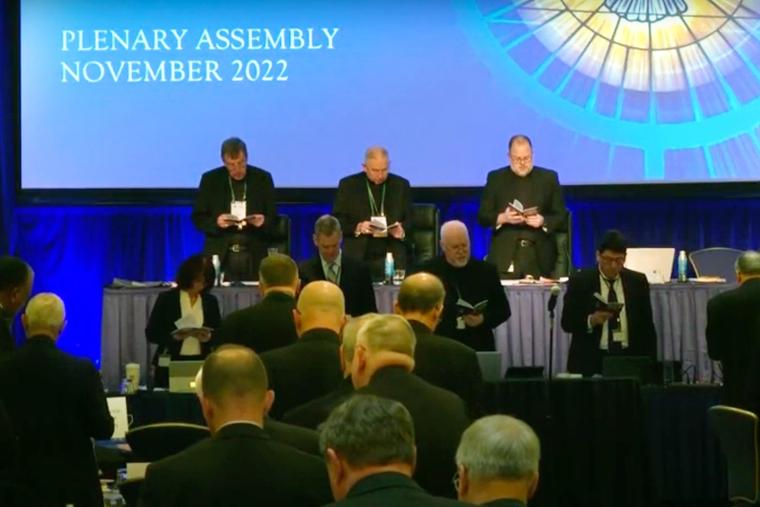- Feb 5, 2002
- 166,640
- 56,271
- Country
- United States
- Faith
- Catholic
- Marital Status
- Married
- Politics
- US-Others
The conference’s annual fall assembly included the election of new leadership, discussion over ‘Faithful Citizenship’ and updates on the Eucharistic Revival.
BALTIMORE — The U.S. Conference of Catholic Bishops addressed the country’s changing political and cultural landscape as its members gathered in Baltimore for their fall plenary assembly Nov. 14-17.
The bishops elected new leadership, discussed approaches to pro-life evangelization in the wake of the overturning of Roe v. Wade, and planned updates to their teaching document on “Faithful Citizenship” in light of current challenges.
On Tuesday, the bishops elected successors to fill the offices of the outgoing president, Los Angeles Archbishop José Gomez, and vice president, Archbishop Allen Vigneron of Detroit. In recent years, the USCCB’s vice president is elected president, but Archbishop Vigneron was too near retirement age to fulfill that role. Archbishop Timothy Broglio of the Archdiocese for the Military Services was elected to head the body. In a runoff, Archbishop Broglio defeated Archbishop William Lori of Baltimore, 138-99. Archbishop Lori was then elected vice president over Bishop Kevin Rhoades of Fort Wayne-South Bend, Indiana, in a runoff by a vote of 143-96.
Archbishop Broglio, 70, told reporters following his election that he was open to dialogue with U.S. political leaders, including President Joe Biden, a baptized Catholic who favors abortion and same-sex civil marriage, views that conflict with the faith.
Continued below.

 www.ncregister.com
www.ncregister.com
BALTIMORE — The U.S. Conference of Catholic Bishops addressed the country’s changing political and cultural landscape as its members gathered in Baltimore for their fall plenary assembly Nov. 14-17.
The bishops elected new leadership, discussed approaches to pro-life evangelization in the wake of the overturning of Roe v. Wade, and planned updates to their teaching document on “Faithful Citizenship” in light of current challenges.
On Tuesday, the bishops elected successors to fill the offices of the outgoing president, Los Angeles Archbishop José Gomez, and vice president, Archbishop Allen Vigneron of Detroit. In recent years, the USCCB’s vice president is elected president, but Archbishop Vigneron was too near retirement age to fulfill that role. Archbishop Timothy Broglio of the Archdiocese for the Military Services was elected to head the body. In a runoff, Archbishop Broglio defeated Archbishop William Lori of Baltimore, 138-99. Archbishop Lori was then elected vice president over Bishop Kevin Rhoades of Fort Wayne-South Bend, Indiana, in a runoff by a vote of 143-96.
Archbishop Broglio, 70, told reporters following his election that he was open to dialogue with U.S. political leaders, including President Joe Biden, a baptized Catholic who favors abortion and same-sex civil marriage, views that conflict with the faith.
Continued below.

US Bishops Tackle Post-Dobbs Evangelization and Changing Political Landscape
The conference’s annual fall assembly included the election of new leadership, discussion over ‘Faithful Citizenship’ and updates on the Eucharistic Revival.
